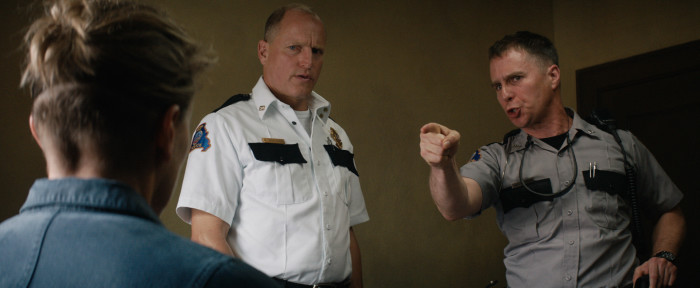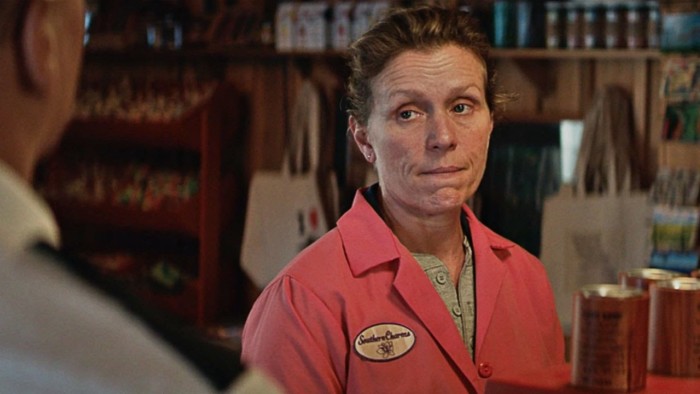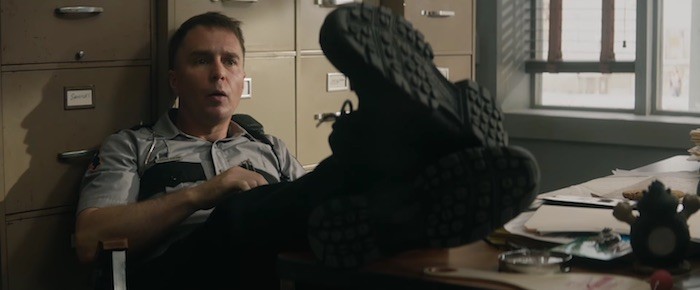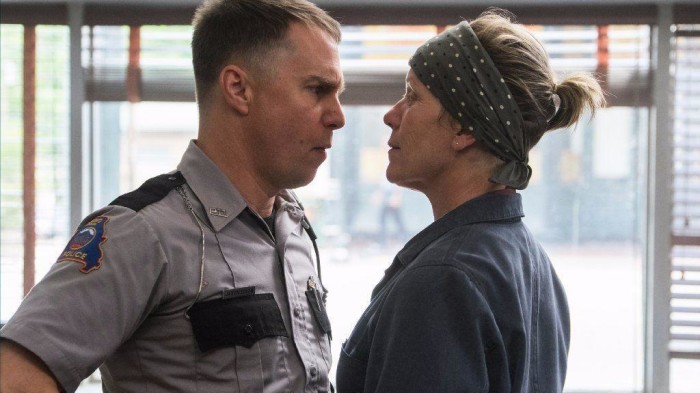'Three Billboards Outside Ebbing, Missouri' Director Martin McDonagh On The Story That Inspired His Film [Interview]
Three Billboards Outside Ebbing, Missouri is a film that will stay with audiences. It's a simple story layered in unexpected complexities brought out by its three leads: Frances McDormand, Woody Harrelson and Sam Rockwell. It's one of the best films of 2017.
In the film, McDormand plays Mildred Hayes , a divorced woman searching for justice for the violent death of her daughter, Angela. It's been seven months since the crime took place and the police, led by Sheriff Bill Willoughby (Harrelson), have yet to find any solid leads to point to anyone worth arresting. Taking matters into her own hands, Mildred uses three billboards located on the outskirts of town to point out the lack of movement on the police's part. As you'd expect, chaos soon follows.
This is the third film from writer/director, Martin McDonagh, who previously helmed In Bruges and Seven Psychopaths. Deeply organic, touching, gut-wrenching and hilarious, Three Billboards Outside Ebbing, Missouri feels like a movie fit for 2017 America.
From my chat with Mr. McDonagh, it seems he would most-definitely agree.
After watching your film, I got lost down multiple research rabbit holes. It feels like Three Billboards is based on a true story. But I haven't found any information to support this theory.
It kind of is! I saw something similar to what we see on our billboards like 17 years ago. I was on a bus going through one of the states – I don't even know now which one it was. Somewhere down in the Georgia, Florida, Alabama corner. It was this similarly statement, sort of calling out the police for not solving a crime. That's all I saw.
That stayed in my mind for like 10 years before I decided that it was a mother who had taken these things out. It all became fiction for me – but it was based on a couple of actual billboards.
There's something very timely about the story you're telling.
The script was written eight years ago, so it's not like a direct response to Trump's America or what's been happening in Missouri over the last couple of years. Those characters and those issues have been around for a long time and will be around for a long time yet.
For me it was more about – rather than talking about what's in the news – being truthful to these three characters. And not having them be stereotypes or archetypes of, you know, the good cop, the bad cop and the grieving mother. Maybe start off from that place, but go to explore the humanity beneath those three things.
 Universal elements of loss, grief and recovery connects every character in the film. The story feels fitting for the stage as well as the big-screen. Was it always your plan to turn this story into a movie?From day one, it was a screenplay. It wasn't plotted out. Apart from the story from the idea I just told you, you know, the billboards and a strong mother, that was all I had. So it was about setting [Mildred] in play, her toughness and her strength, and then seeing how people reacted to it, how the police reacted to it, and then how she reacted to them.It was born very organically and I was surprised as each scene evolved to see what she would do next, or what they would do to counteract it. Did you always have the three leads in mind when you were penning the script?
Universal elements of loss, grief and recovery connects every character in the film. The story feels fitting for the stage as well as the big-screen. Was it always your plan to turn this story into a movie?From day one, it was a screenplay. It wasn't plotted out. Apart from the story from the idea I just told you, you know, the billboards and a strong mother, that was all I had. So it was about setting [Mildred] in play, her toughness and her strength, and then seeing how people reacted to it, how the police reacted to it, and then how she reacted to them.It was born very organically and I was surprised as each scene evolved to see what she would do next, or what they would do to counteract it. Did you always have the three leads in mind when you were penning the script?
It was written for Frances [McDormand], very specifically. If she said no, I'd have been fucked because I don't know where we'd have gone. It was written for Sam [Rockwell] as well. Both this and the Seven Psychopaths character were written for him. I've always loved Woody [Harrelson] so I always wanted to work with him too. But, yeah, those two were particularly written for.
How do their previous roles and career choices inform your writing process?
Like for Sam's character, you know, he's played dark characters like that in the past so that voice is there in your head. But you know he's got a decency and humanity to him too. So, you hope that he'll bring that to the field of play. And Frances...it's not just what she's done on-screen before, it's how she is off-screen, too! She's got that kind of fierce sort of determined reputation. And that's something you want to tap into.
But it's also tapping into an audience's love for those aspects of an actor. I think that's why people go with Frances so much in this, is that they kind of like that she's a little ornery in her real life. Ornery might be the wrong word, but she doesn't play the game. And this character doesn't play the game. It's a perfect welding of those two things.
 There's this theme of resistance, of questioning authority, that is featured throughout the film. Mildred seems to embody the many different layers those feelings have been represented in our culture recently.
There's this theme of resistance, of questioning authority, that is featured throughout the film. Mildred seems to embody the many different layers those feelings have been represented in our culture recently.
She's not all perfect, either. She has as many imperfections and issues as the villains of the piece. And the villains aren't all villainous either. The starting point was rage and anger and outrage, I guess. But I didn't want to stay in that place.
As we filmed it, and in the edit, I feel like the hope and humanity just kept coming through. It was there in the story. But I think, in the playing of it by those three especially, the details they brought to it were about hope. They were playing it as truthful – not as villains or heroes – so that was all there. But the little touches when they looked away or when they're on their own, that's when the hope started blossoming.
 The closest the movie has to a villain is Sam Rockwell's character of Officer James Dixon. Even he has a compelling story arc. But what I found truly fascinating is, you flipped the script and made the bully a comic-book nerd. Was that always the plan?
The closest the movie has to a villain is Sam Rockwell's character of Officer James Dixon. Even he has a compelling story arc. But what I found truly fascinating is, you flipped the script and made the bully a comic-book nerd. Was that always the plan?
That kind of came a little later, just in terms of what he would be reading. It was never going to be books. So then, when it was comics, I didn't want it to be like the everyday Marvel/DC kind of thing. When I was a kid, it was more about the independent comic-books.
So, would it be truthful that a character like him would be really into indie comics? I don't know, maybe not. But I'd rather put an indie comic on screen than a Marvel or DC one
Murder mysteries usually set audiences up for a clear-cut resolution. In this formula, a hunt for a killer usually results in finding said killer. Your movie works quite differently than that. The resolution we're expecting isn't quite clear-cut.
It's a different kind of closure, in fact. It's a different kind of ending. That was always part of what I wanted to do. It's a fact that a lot of murder cases – not most, it's pretty close to 50/50 – don't have a solution. They don't find a culprit. What happens to the people left behind after that?
If there's always righteous anger out there and you still can't help...if you still can't get it solved, where does that leave people? This ending is the most hopeful place that these people could be left, I guess. As you said, it's a different ending. It's not wrapped up with a bow. But I think it means it's a film that you can maybe watch more than once. Because, with things like when the murder is solved and everything's wrapped up perfectly, why watch it twice? This is not about that. It's about something more human and more momentous, I think.
 What are you hoping audiences will take away from the film once they leave the theater?I think the hope and the change. Again, this may be highfalutin, but nothing's black and white. There are lots of grey areas and if we take a step back from the rage and anger for a little bit, and see the humanity on the other side, there may be more room to maneuver than we might think.
What are you hoping audiences will take away from the film once they leave the theater?I think the hope and the change. Again, this may be highfalutin, but nothing's black and white. There are lots of grey areas and if we take a step back from the rage and anger for a little bit, and see the humanity on the other side, there may be more room to maneuver than we might think.
***
Three Billboards Outside Ebbing, Missouri hit theaters everywhere on Friday, November 10, 2017.
